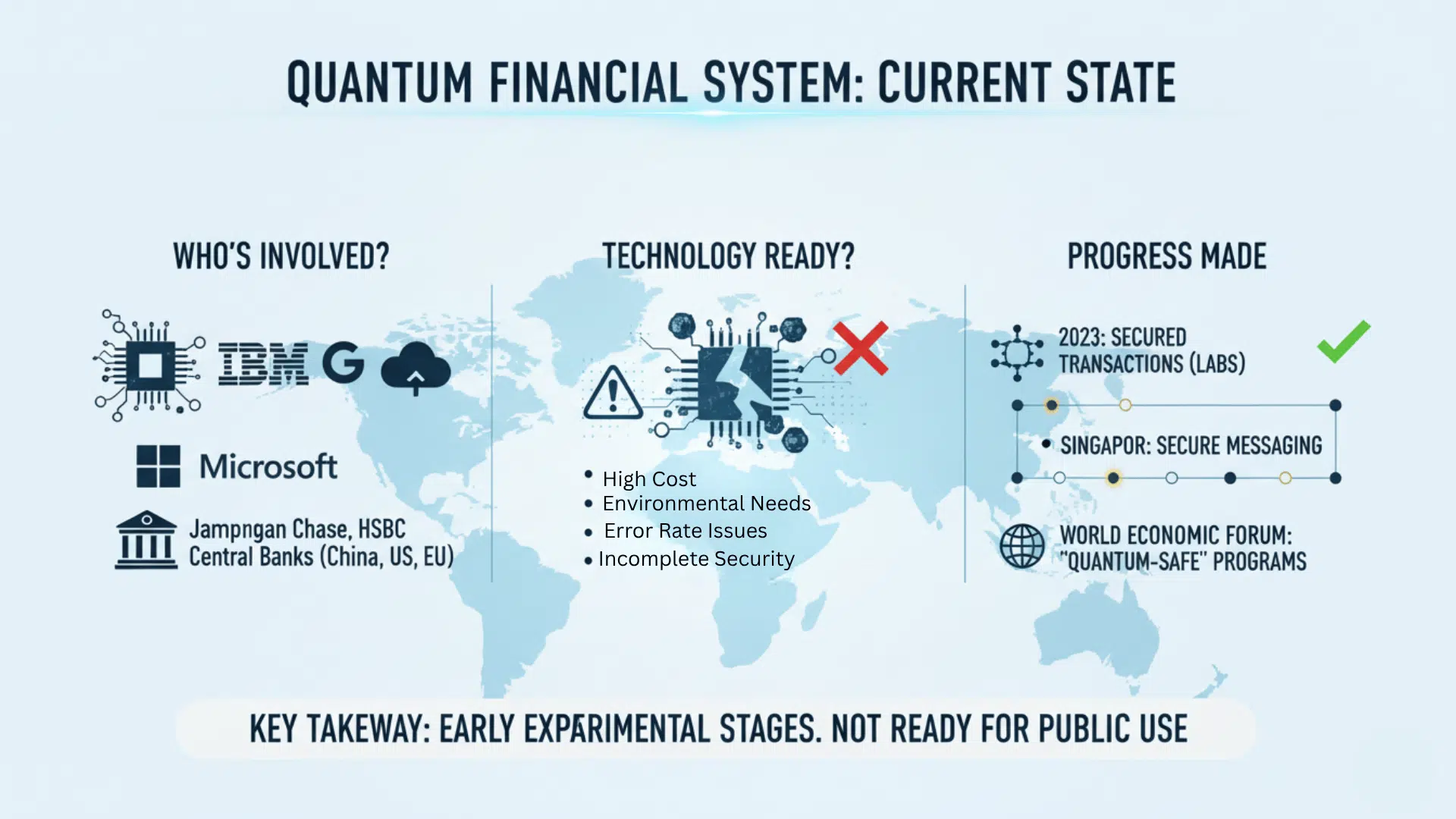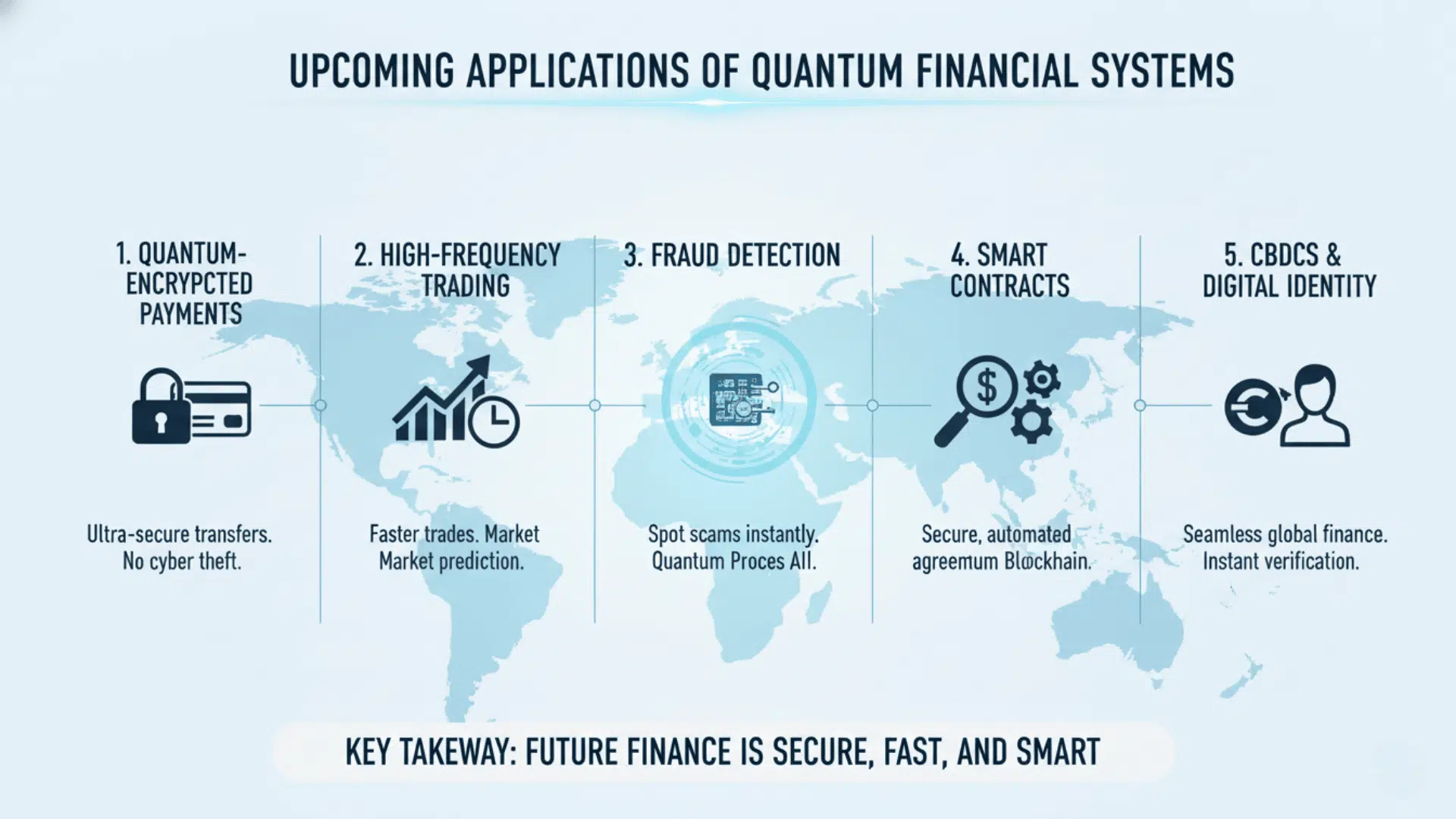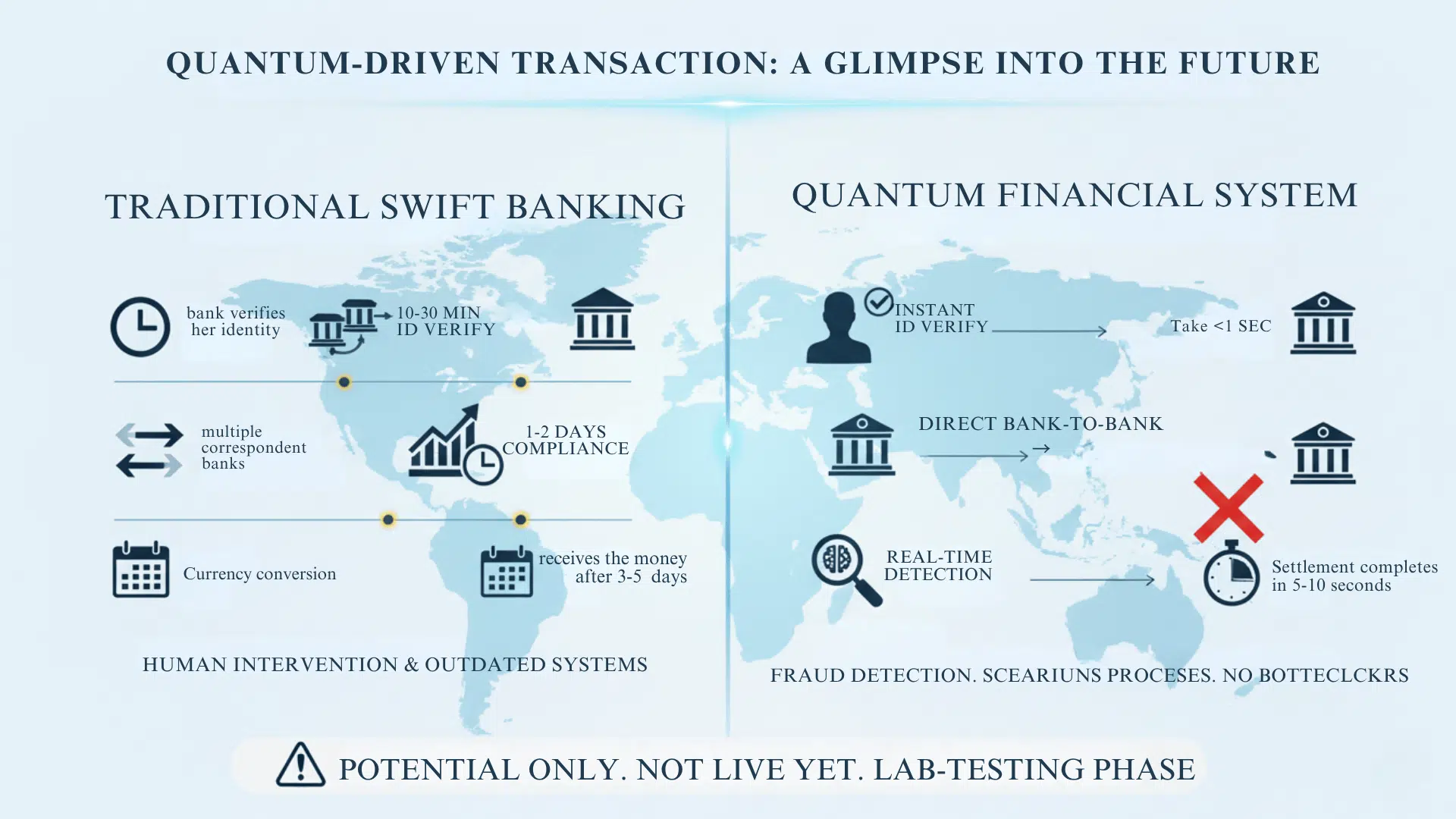Are you wondering when the Quantum Financial System will actually start? You’re not alone.
Thousands of people are searching for answers about this technology that promises to change banking forever.
The problem is that there’s a lot of confusion online. Some sources claim QFS is already live, while others say it’s years away. So what’s the truth?
Here’s what you’ll learn in this article. We’ll explain what QFS actually is and when experts think it might launch.
You’ll see the real timeline, understand how QFS accounts would work, and learn about both the benefits and risks. We’ll also help you spot scams and prepare for this potential shift in global finance.
Let’s clear up the confusion and get you the facts.
What is the Quantum Financial System (QFS)
The Quantum Financial System is a proposed digital framework that aims to transform how money moves around the world.
It combines three powerful technologies: quantum computing for ultra-fast calculations, artificial intelligence for smart decision-making, and blockchain for transparent record-keeping.
The main goal is simple yet ambitious. QFS wants to replace old banking systems with something faster, safer, and more open.
Think of it as an upgrade from sending letters to sending instant messages. However, it’s important to separate fact from fiction here.
While research labs and major banks are exploring quantum technology for finance, many claims online about QFS being “already active” or “ready to launch” are not backed by verified sources.
Right now, QFS exists more as a concept and early-stage experiment than a working system you can use today.
Current State of the Quantum Financial System


The Quantum Financial System is not live yet. It’s still being tested in labs and research centers. Major banks and tech companies are collaborating to determine if this technology can actually work in real life.
Who’s involved in QFS research?
- Big tech firms like IBM, Google, and Microsoft are building quantum computers
- Banks such as JPMorgan Chase and HSBC are running early tests
- Central banks in China, the US, and Europe are exploring quantum encryption
- Private fintech labs are testing small-scale quantum transactions
Is the technology ready?
Not quite. Quantum computers are powerful but still have major limitations. They’re expensive to build and maintain. They need super cold temperatures to function. They also make errors that need constant fixing. Security features are improving, but we’re not there yet.
What progress has been made?
Some promising tests have happened:
- In 2023, several banks completed quantum-secured transaction trials in controlled settings
- Singapore’s central bank tested quantum communication for secure financial messaging
- The World Economic Forum started “quantum-safe finance” programs to prepare banks for this technology
These tests show potential, but they’re small and private. No public system exists.
Key takeaway: QFS is in early experimental stages. No bank or country has launched a working quantum financial system that people can actually use. It’s being developed, but it’s not ready for the real world yet.
When Will the Quantum Financial System Launch?
Experts don’t have a fixed launch date for the Quantum Financial System. The timeline depends on how fast the technology improves and how quickly countries can agree on global standards. Most predictions suggest a phased approach over the next decade.
Projected QFS Development Timeline
| Phase | Timeline | What Happens |
|---|---|---|
| Development & Testing | Present–2026 | Building quantum computers, testing encryption methods, and running small experiments in labs |
| Pilot Integrations | 2026–2028 | Limited trials with select banks, cross-border payment tests, and refining security protocols |
| Gradual Adoption | Post-2028 | Slow rollout to financial institutions, integration with existing systems, and public access begin |
Why isn’t there an official launch date?
Several factors are slowing things down:
- Technology maturity: Quantum computers are still unstable and expensive. They need years of improvement before they can handle global financial transactions reliably.
- International policy alignment: Countries need to agree on how quantum finance should work. Different regulations, security standards, and economic priorities make global coordination difficult.
- Financial standardization: Banks worldwide use different systems. Creating standards that work for everyone takes time and careful planning.
Think of it like building the internet. It didn’t appear overnight. It took decades of testing, standardization, and gradual adoption before it became what we use today. QFS will likely follow a similar path.
The Structure of a QFS Account (Quantum Financial System Account)
A QFS account is a theoretical digital banking account that would use quantum technology to store and transfer money.
In concept, it would have three main features: quantum encryption to verify your identity with unbreakable security codes, direct global settlements that let you send money anywhere without banks or middlemen slowing things down, and real-time balance updates that sync instantly across all countries.
Sounds great, right? But here’s the truth: no verified bank offers QFS accounts yet. They don’t exist for public use.
If you see websites or social media posts claiming you can “activate your QFS account” or “pre-register for quantum banking,” be very careful. These are likely scams designed to steal your personal information or money.
Legitimate financial institutions haven’t launched QFS accounts, and they won’t ask you to sign up through unofficial channels.
Until major banks make official announcements, any QFS account offer you find online should be treated as suspicious. Stay safe and wait for verified sources before sharing any financial details.
Upcoming Applications of Quantum Financial Systems


Researchers and financial institutions are exploring several practical uses for quantum technology in banking. These applications are still in development, but they show how QFS could change everyday finance.
1. Quantum-Encrypted Payments
This technology would create ultra-secure money transfers that hackers can’t break into. Quantum encryption uses complex mathematical codes that current computers can’t crack.
Banks could send large payments across borders without worrying about cyber theft or data breaches.
2. High-Frequency Trading Optimization
Quantum computers can analyze massive amounts of market data in seconds. Trading firms are testing quantum algorithms to predict stock movements and execute trades faster than ever before.
This could give investors better timing and more accurate market insights.
3. Fraud Detection and Predictive Analytics
Quantum AI systems can spot unusual transaction patterns that humans and regular computers might miss.
These systems learn from millions of transactions to identify fraud before it happens. Banks could stop scams in real time instead of discovering them days later.
4. Smart Contracts Enhanced by Quantum Blockchain
Smart contracts are digital agreements that execute automatically when conditions are met.
Quantum blockchain technology could make these contracts faster, more secure, and capable of handling complex financial terms. This would improve transparency and reduce the need for lawyers or intermediaries.
5. Integration with CBDCs and Digital Identity Systems
Central banks are developing digital currencies that quantum systems could support. QFS might verify your identity instantly and securely when you use government-backed digital money.
This combination could create a seamless system where your financial identity and digital wallet work together globally.
Benefits vs. Risks & Challenges of the Quantum Financial System
While the Quantum Financial System promises to revolutionize global finance, it’s important to weigh its potential benefits against the risks and challenges that come with such advanced technology.
| Aspect | Benefits | Risks & Challenges |
|---|---|---|
| Security | Quantum cryptography creates unbreakable codes that protect against hacking and fraud | Quantum technology could also break existing encryption systems if misused by criminals or hostile states |
| Speed & Efficiency | Instant international settlements, lower transaction costs, and no need for middlemen banks | Quantum computers are still error-prone, unstable, and cost millions to build and maintain |
| Transparency | All transactions are recorded permanently and cannot be altered or deleted | Moving data from old banking systems to quantum platforms risks system failures and data loss |
| Global Access | Anyone with internet access can use the system without needing approval from traditional banks | Countries or banks adopting QFS first could gain unfair advantages, widening economic gaps |
| Regulation | Could create standardized global financial rules for better oversight | No global standards exist yet, creating legal confusion and compliance issues for international use |
Example: A Glimpse into a Quantum-Driven Transaction


Let’s see how a quantum-secured payment would actually work compared to traditional banking. Imagine Sarah in New York needs to send $10,000 to her supplier in Tokyo.
Traditional SWIFT Banking (Current System)
- Sarah requests the transfer at her bank
- Her bank verifies her identity (takes 10-30 minutes)
- The payment goes through multiple correspondent banks
- Each bank checks for fraud and compliance (1-2 days)
- Currency conversion happens at each step
- The supplier receives the money after 3-5 business days
- Total fees: $40-$75
Quantum Financial System (Future Vision)
- Sarah initiates the transfer through her QFS account
- Quantum encryption instantly verifies her identity in under 1 second
- AI-powered fraud detection scans the transaction in real time
- The payment goes directly to the supplier’s bank without intermediaries
- Settlement completes in 5-10 seconds
- The supplier sees the money immediately
- Total fees: $2-$5
What makes it faster?
The quantum system does three things simultaneously. It verifies Sarah’s identity using quantum-encoded security. It checks for fraud using AI that analyzes patterns instantly.
It settles the payment directly between banks without waiting for multiple approvals. Current SWIFT transfers require human intervention and outdated systems at each step, which adds hours or days. Quantum technology removes these bottlenecks entirely.
This example shows the potential, but remember: no live QFS system exists yet. These capabilities are still being tested in controlled environments.
The Future of the Quantum Financial System
The next decade could bring major changes to how money works globally.
Experts predict that quantum technology will gradually merge with digital currencies issued by central banks and smart contracts that execute financial agreements automatically.
As quantum computers become more powerful, the cybersecurity industry will build quantum-resistant protection systems to keep data safe from future threats.
Banks will need to retrain their employees and upgrade their infrastructure to handle quantum technology, which means new jobs will emerge while some traditional roles may disappear.
The long-term vision is ambitious: a fully connected global economy where every financial institution uses quantum-secured systems to move money instantly and safely across borders.
This would create one unified network instead of the fragmented banking system we have today.
However, getting there will take time, cooperation between countries, and significant investment in both technology and education. The future looks promising, but it won’t happen overnight.
Final Verdict
So, when will the Quantum Financial System start? The honest answer is that no one knows the exact date yet.
QFS is still in early development and testing phases. Experts predict gradual adoption starting after 2028, but technology and regulatory challenges could shift that timeline.
Stay informed by following reputable fintech news sources and official announcements from central banks. Avoid any websites claiming you can open QFS accounts now, as these are likely scams.
The quantum financial system represents an exciting possibility for global banking, but we need patience and realistic expectations as the technology develops.
What do you think about the future of quantum finance? Share your thoughts in the comments below, and subscribe for updates on financial technology trends.

